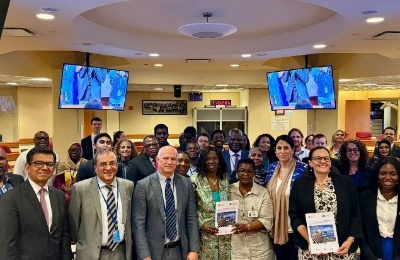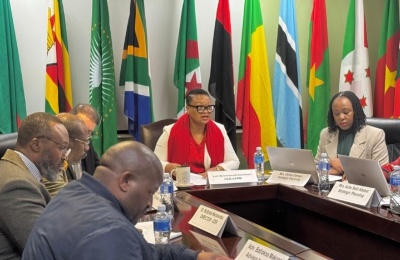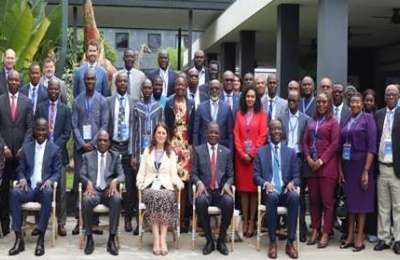
APRM Champions Knowledge Sharing and Peer Learning amongst African and European partners at HLPF 2025
APRM Champions Knowledge Sharing and Peer Learning amongst African and European partners at HLPF 2025
Date:
31 July 2025
On 22 July, the OECD-APRM high-level side event on the Governance of Ocean (SDG 14/Moonshot 1 of Agenda 2063) underscored the AU efforts to enhance blue economy governance while African and European countries, including Italy, Portugal, Malta, Sierra Leone, Namibia, Sudan and Uganda shared national strategies to improve the management of marine resources.
H.E. Selma Haddadi provided a keynote statement at the opening session of the event as she displayed the AU efforts to promote blue economy and maximise African countries’ marine resources for sustainable development.
APRM CEO Amb. Marie-Antoinette Rose Quatre, via a recorded message, reaffirmed the importance of policy coherence, institutional synergy, and African ownership in translating the Freetown Declaration into measurable outcomes. The OECD Deputy Secretary-General, Mary Beth Goodman, stressed the need for frameworks to be translated into action. She underscored that SDG 14—the goal for sustainable ocean governance—is still the least funded across the SDGs. She called for deeper OECD‑Africa partnerships to mainstream policy coherence in climate and maritime sectors.
Rt. Hon. Justine Kasule Lumumba of Uganda emphasised the fact that without effective intra‑African trade systems, the continent’s blue economy remains underdeveloped. Hon. Kenyeh Ballay of Sierra Leone spoke of her country’s journey in integrating fisheries planning, coastal resilience, and climate adaptation under APRM‑led reforms. Mr. Alessandro Guerri, Director General for European and International Affairs and Finance, reiterated Italy’s support for coherent policies in global maritime governance, while Mr. Jean Paul Adam from UNOSAA urged embedding coherence checks into national budgets. Francine Pace Caruana from Malta described multi-level governance coordination as foundational to small island states’ ocean economies.
The Event witnessed the launch of APRM-OECD Regional Report on Policy Coherence for Sustainable Development, which displayed outcomes of institutional scanning of four African countries – Kenya, Namibia, Ghana and South Africa on policy coherence drivers and role of APRM in promoting policy coherence through its reviews and other support programmes.
The APRM equally supported the Pathfinders Lab which centred on citizen participation and the engagement of civil society, youth organizations, and national statistics offices in shaping Voluntary National Reviews. The discussion situated SDG 16 and Moonshot 3 of Agenda 2063 at its heart, encouraging transparent dialogue and collective accountability. A representative from a national statistics office commented that “embedding citizen voices in the review process ensures legitimacy and trust in our data,” underscoring the essential role of inclusive participation for sustainable monitoring.
On 23 July, APRM and UN DESA convened a lab on the theme: “Promoting Competencies and New Mindsets for the Future of Governance in the Global South.” The session reflected on governance innovations such as Azerbaijan’s ASAN public service model, which has streamlined citizen-focused service delivery. Participants also reviewed the newly unveiled APRM–AAPAM competency toolkit. As Ms. Sara Hamouda explained, “these tools are not just capacity-building instruments—they serve as bridges for mindset change in public administration.”
The conversation emphasised the urgent need to reform civil service systems, embed future-oriented competencies, and harness digital transformation as a deliberate vehicle for advancing the SDGs and contextualising Agenda 2063 within national governance reforms. These VNR Labs reinforced APRM’s strategic vision that sustainable governance transformation depends on integrated planning, inclusive participation, and future-oriented institutional design. They offered critical peer‑learning moments and practical dialogue to inform government VNR processes and national institutional reform.
The week culminated on 24 July with the joint UNOSSC-APRM-UNDP-Islamic Development Bank Roundtable titled: “Taking the Freetown Declaration into Action: Leveraging South-South and Triangular Cooperation for Economic Resilience and Youth Empowerment in Africa.” Held in the UNOSSC Qatar Room, the Hybrid Roundtable convened over 50 delegates representing national APRM structures, youth leaders, diaspora institutions, multilateral banks, civil society, and policy practitioners.
Several key resolutions emerged, including the continued commitment of African states to integrate South-South and Triangular Cooperation (SSTrC) into national development plans, legal frameworks, and APRM national action agendas. Delegates also emphasized the need to accelerate the establishment of the African Credit Rating Agency (AfCRA) to enhance financial credibility; fast-track the adoption of digital governance platforms and open-source systems; and scale up climate-resilient agricultural initiatives—such as Feed Salone—through blended finance. In parallel, they called for the creation of a continent-wide Youth SSTrC Network and the implementation of gender-responsive budgeting frameworks.
H.E. Kenyeh Ballay, APRM Focal Point for Sierra Leone, commended the international and continental support for the third edition of the Forum, highlighting that “It was not just a forum, but a continental turn point that we should take advantage of”.
As far as priorities of the Sierra Leone are concerned, Mrs. Ballay emphasised the following:
- Institutionalising South-South Cooperation through the establishment of the Directorate for South-South Cooperation under the Ministry of Planning and Economic Development. It is envisaged that the Direcorate will serve as a coordination mechanism for SSC programmes.
- Leveraging on SSC partnerships to implement the recommendations of APRM reviews for building resilience and agile civil service in Sierra Leone.
- Promoting knowledge exchange and benchmarking with African countries which are willing to support Sierra Leone transformative journey.
- Leveraging on Sierra leones’ chairship of ECOWAS to promote SSC with other partners to implement four strategic areas identified by H.E. Julius Maada Bio, President of the Republic of SierraLeone. These include regional security, economic integration, enhancement of ECOWAS as an institution and preparing the future of the regional community.
The Roundtable reaffirmed APRM’s pivotal role in anchoring these commitments, noting that the implementation of the Freetown Declaration will hinge on systematic follow-up, peer-learning cohorts, and continental coordination. APRM announced plans for a scorecard mechanism, to assess national progress and support replication of best practices across its Participating States.
The APRM’s participation in the 2025 UN High-Level Political Forum, through multiple VNR Labs and high-level discussions, reaffirmed its leadership in mobilizing African expertise, facilitating peer learning and knowledge sharing among African countries and global partners, and promoting governance coherence across the continent. As the APRM continues to strengthen institutional capacity and expand peer networks, it remains firmly committed to translating the commitments made at its continental forums and the recommendations from peer reviews into tangible outcomes, advancing the vision of a well-governed and prosperous Africa for the benefit of its citizens.
Last update
31/07/2025, 10:01
 APRM Knowledge Hub
APRM Knowledge Hub







